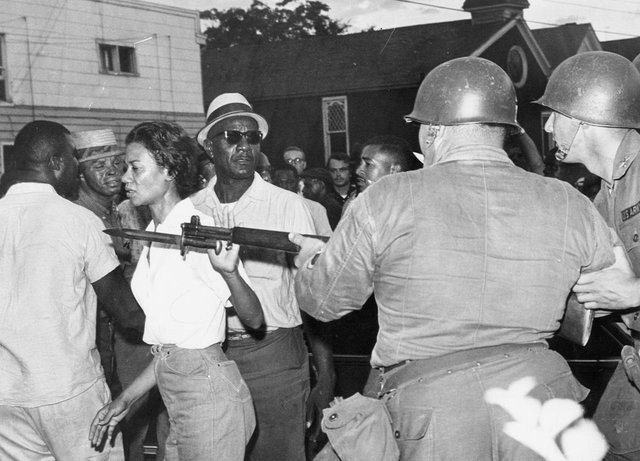1963 - Civil Rights Movement
A pivotal year in the campaign for black rights, which saw hundreds of thousands take part in the March on Washington led by Martin Luther King, as well as acts of violence, political theater and direct action across the USA.

On 28 August, in the shadow of Lincoln's monument, Martin Luther King announced to the March on Washington during his famous "I have a dream" speech that "1963 is not an end, but a beginning". For legal segregation, it would turn out to be the beginning of the end. The year started with Alabama governor George Wallace standing on the steps of the state capitol in hickory-striped trousers and a cutaway coat declaring: "Segregation now, segregation tomorrow, segregation for ever." The civil rights leadership was ambivalent about the suggestion of a national march and President John F Kennedy was focused on foreign affairs. Within a few months Alabama would become internationally renowned as policemen turned dogs and high-pressure water hoses on children as young as six in Birmingham. Civil rights leaders were running to catch up with the militancy of their grassroots activists and the Democratic House majority leader told Kennedy: "[Civil rights] is overwhelming the whole programme".
In 1963 the number who were prepared to commit such resistance reached a critical mass. Int he south particularly, the struggle had grown from a modest group of black students demonstrating at one lunch-counter to the largest mass movement for racial reform and civil rights in the 20th century.
In May, events in Birmingham, Alabama, were transformative. The New York Times published more stories about civil rights in those two weeks than it had in the previous two years. Televised scenes of children campaigning against rigid segregation, being bitten by Alsatians and knocked off their feet by water fired with enough power to rip bark off a tree caused international outrage. Before, only 4% of Americans thought civil rights was the country's most pressing issue; afterwards it was 52%.
According to the Justice Department, in the 10 weeks before King's "I have a dream" speech there were 758 demonstrations in 186 cities resulting in 14,733 arrests. "Birmingham became the moment of truth," argued Bayard Rustin, who organised the March on Washington. "Birmingham meant that tokenism is finished. The Negro masses are no longer prepared to wait for anybody … They are going to move. Nothing can stop them."
The march for jobs and freedom in Washington, which had aroused precious little interest just months before, now became the order of the day. It was a bold initiative. At the time marches in the capital were rare and this one was not particularly popular. A poll just a few weeks before the march revealed that 71% of Americans knew about it and of those only 23% were favourable while 42% were unfavourable, 18% thought it wouldn't accomplish anything and 7% thought it would end in violence. Kennedy, who was trying to get civil rights legislation through Congress, tried to talk them out of it. "We want success in Congress, not just a big show at the capitol," he said. Union organiser A Philip Randolph, who had called the march, told him: "The Negroes are already in the streets. It is very likely impossible to get them off."
Still, the march drew 250,000 people, roughly a quarter of whom were white and was deemed a great success by many. King's speech – which received no mention in the Washington Post the following day – would eventually become its most celebrated articulation of the period. "That day for a moment it almost seemed that we stood on a height," wrote James Baldwin in No Name in the Street. "And could see our inheritance; perhaps we could make the kingdom real, perhaps the beloved community would not for ever remain that dream one dreamed in agony."
It did not take long for the realities of southern bigotry to deflate the mood. "There was no way we could have known then that that afternoon would represent the peak of such feelings, that the hope and optimism contained in King's words would dwindle in the coming years," wrote Congressman John Lewis; "that in a matter of mere days after he stepped down from that stage a bomb blast in Birmingham would kill four little girls and usher in a season of darkness for the movement and for me."
For more details and images from events in 1963, check out History0x